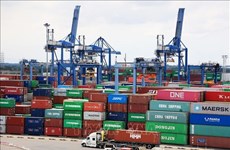Industrial production sees good signs
Industrial production is expected to improve in Q2 as domestic firms step up raw material
imports.
Vietnam’s industrial production is expected to improve in the second
quarter of this year as many domestic enterprises step up raw material
imports for production, said Nguyen Tien Vy, an official from the
Ministry of Industry and Trade (MoIT).
The planning department director told a meeting in Hanoi on April 1 that inventory levels in the steel industry have fallen sharply and hovered at about 280,000 tonnes. He said many garment and textile enterprises have already received stable orders for the second quarter and are negotiating for the third.
In the first quarter, the index of industrial production (IIP) reached a low level of 4.9 percent, compared with 5.9 percent in the correspondent period last year.
Vy said inventories began to increase in March, adding that the rate for manufacturing and processing industries was 16.5 percent higher than those of the same period 2012.
Sectors with high inventories included electricity cable (62 percent), metal components (35.5 percent), motor vehicles (37.3 percent), concrete, cement and plaster (28 percent), and chemicals (27.4 percent).
He attributed the reduction of industrial production to the 9-day-long Tet (Lunar New Year) holiday and to economic difficulties.
Vietnam is expected to have a trade surplus of 482 million USD in the first quarter of this year with a total export turnover of 29.68 billion USD, a year-on-year rise of 19.7 percent.
Ministry statistics showed that the surplus will mainly come from the foreign direct investment (FDI) sector. The domestic sector saw imports exceed exports by more than 2.6 billion USD while FDI businesses had a trade surplus of 3.1 billion USD.
MoIT Deputy Minister Tran Quoc Khanh said the FDI sector helped the export value of mobile phones and components hit 4.48 billion USD, and electronic products, 2.42 billion USD.
However, the nation’s key export products slowed, with rice export value falling by 3.1 percent and fishery products down 5.5 percent.
A rice reserve of 1 million tonnes helped push up the rice price by 100-300 VND per kilogramme, said Nguyen Minh Toai, director of the Department of Industry and Trade of the Mekong Delta city of Can Tho .
But many enterprises did not buy rice directly from farmers and profits mostly fell into the hands of intermediaries, he said, urging an increase in the floor rice price to be considered carefully to improve farmer’s incomes.
MoIT Minister Vu Huy Hoang said the ministry will further assist enterprises with capital, administrative procedures and markets to help them overcome the hard time.
“The ministry will keep a close watch on market changes so that it can advise enterprises when to limit business risks,” he said. “We will also take necessary steps to assure goods reserves to prevent falls in export prices.”
Hoang urged organisations to strengthen promotional activities to boost consumption and reduce inventories.
“Drastic measures must be taken during the remainder of the year so that the year’s target can be fulfilled, especially when the nation’s major export markets, including the US, the European Union and Japan haven’t shown any clear signs of recovery,” said Khanh.
According to economic expert Nguyen Minh Phong, domestic enterprises should enhance their competitiveness, especially raising the added value of their products.-VNA
The planning department director told a meeting in Hanoi on April 1 that inventory levels in the steel industry have fallen sharply and hovered at about 280,000 tonnes. He said many garment and textile enterprises have already received stable orders for the second quarter and are negotiating for the third.
In the first quarter, the index of industrial production (IIP) reached a low level of 4.9 percent, compared with 5.9 percent in the correspondent period last year.
Vy said inventories began to increase in March, adding that the rate for manufacturing and processing industries was 16.5 percent higher than those of the same period 2012.
Sectors with high inventories included electricity cable (62 percent), metal components (35.5 percent), motor vehicles (37.3 percent), concrete, cement and plaster (28 percent), and chemicals (27.4 percent).
He attributed the reduction of industrial production to the 9-day-long Tet (Lunar New Year) holiday and to economic difficulties.
Vietnam is expected to have a trade surplus of 482 million USD in the first quarter of this year with a total export turnover of 29.68 billion USD, a year-on-year rise of 19.7 percent.
Ministry statistics showed that the surplus will mainly come from the foreign direct investment (FDI) sector. The domestic sector saw imports exceed exports by more than 2.6 billion USD while FDI businesses had a trade surplus of 3.1 billion USD.
MoIT Deputy Minister Tran Quoc Khanh said the FDI sector helped the export value of mobile phones and components hit 4.48 billion USD, and electronic products, 2.42 billion USD.
However, the nation’s key export products slowed, with rice export value falling by 3.1 percent and fishery products down 5.5 percent.
A rice reserve of 1 million tonnes helped push up the rice price by 100-300 VND per kilogramme, said Nguyen Minh Toai, director of the Department of Industry and Trade of the Mekong Delta city of Can Tho .
But many enterprises did not buy rice directly from farmers and profits mostly fell into the hands of intermediaries, he said, urging an increase in the floor rice price to be considered carefully to improve farmer’s incomes.
MoIT Minister Vu Huy Hoang said the ministry will further assist enterprises with capital, administrative procedures and markets to help them overcome the hard time.
“The ministry will keep a close watch on market changes so that it can advise enterprises when to limit business risks,” he said. “We will also take necessary steps to assure goods reserves to prevent falls in export prices.”
Hoang urged organisations to strengthen promotional activities to boost consumption and reduce inventories.
“Drastic measures must be taken during the remainder of the year so that the year’s target can be fulfilled, especially when the nation’s major export markets, including the US, the European Union and Japan haven’t shown any clear signs of recovery,” said Khanh.
According to economic expert Nguyen Minh Phong, domestic enterprises should enhance their competitiveness, especially raising the added value of their products.-VNA













